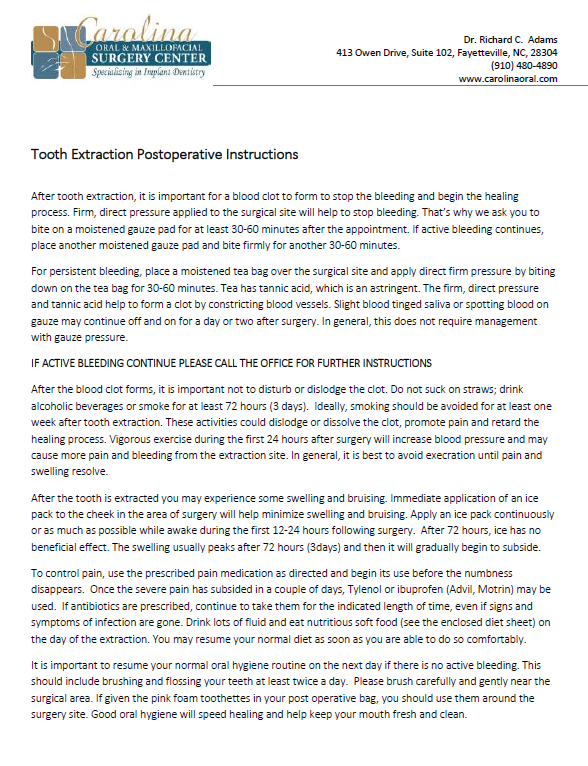ToothExtraction
After tooth extraction, it is important for a blood clot to form to stop the bleeding and begin the healing process. Firm, direct pressure applied to the surgical site will help to stop bleeding. That’s why we ask you to bite on a moistened gauze pad for at least 30-60 minutes after the appointment. If active bleeding continues, place another moistened gauze pad and bite firmly for another 30-60 minutes.
For persistent bleeding, place a moistened tea bag over the surgical site and apply direct firm pressure by biting down on the tea bag for 30-60 minutes. Tea has tannic acid, which is an astringent. The firm, direct pressure and tannic acid help to form a clot by constricting blood vessels. Slight blood tinged saliva or spotting blood on gauze may continue off and on for a day or two after surgery. In general, this does not require management with gauze pressure.
IF ACTIVE BLEEDING CONTINUE PLEASE CALL THE OFFICE FOR FURTHER INSTRUCTIONS
After the blood clot forms, it is important not to disturb or dislodge the clot. Do not suck on straws; drink alcoholic beverages or smoke for at least 72 hours (3 days). Ideally, smoking should be avoided for at least one week after tooth extraction. These activities could dislodge or dissolve the clot, promote pain and retard the healing process. Vigorous exercise during the first 24 hours after surgery will increase blood pressure and may cause more pain and bleeding from the extraction site. In general, it is best to avoid execration until pain and swelling resolve.
After the tooth is extracted you may experience some swelling and bruising. Immediate application of an ice pack to the cheek in the area of surgery will help minimize swelling and bruising. Apply an ice pack continuously or as much as possible while awake during the first 12-24 hours following surgery. After 72 hours, ice has no beneficial effect. The swelling usually peaks after 72 hours (3days) and then it will gradually begin to subside.
To control pain, use the prescribed pain medication as directed and begin its use before the numbness disappears. Once the severe pain has subsided in a couple of days, Tylenol or ibuprofen (Advil, Motrin) may be used. If antibiotics are prescribed, continue to take them for the indicated length of time, even if signs and symptoms of infection are gone. Drink lots of fluid and eat nutritious soft food (see the enclosed diet sheet) on the day of the extraction. You may resume your normal diet as soon as you are able to do so comfortably.
It is important to resume your normal oral hygiene routine on the next day if there is no active bleeding. This should include brushing and flossing your teeth at least twice a day. Please brush carefully and gently near the surgical area. If given the pink foam toothettes in your post operative bag, you should use them around the surgery site. Good oral hygiene will speed healing and help keep your mouth fresh and clean.
If Peridex( chlorhexidine) oral rinse has been prescribed, follow the instructions on the bottle. Rinse with one capful in the mouth and spit out twice a day after brushing for 10-14 days. You should start the Peridex (chlorhexidine) rinse on the day following surgery.
If you have prolonged heavy bleeding, fever of 101 or higher, severe pain or swelling that does not start to improve after 72 hours (3 days) please call our office : During normal hours (910) 480-4890 After hours: cap full(910) 480-4890 select option #3.
It is important to replace a missing tooth for the following reasons: improved chewing efficiency, improved speech articulation, stabilization of occlusion (preventing shifting of the teeth), comfort, and self confidence. In most cases the best way to replace a missing tooth is with a dental implant.
If an implant is not placed immediately, the extraction site should be evaluated for implant placement about 7-8 weeks after tooth extraction. Waiting too long for implant placement after an extraction can result in shifting of the teeth and bone loss due to bone resorption prohibiting future implant insertion.
If you would like more information regarding dental implants, please call our office.


